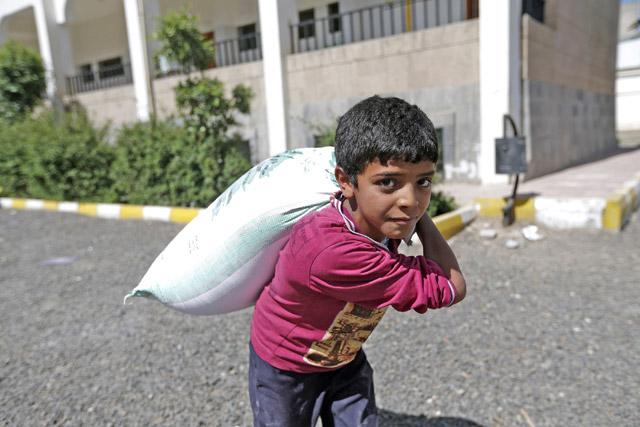You are here
Yemen cholera death toll rises, but number of infections drop — WHO
By Reuters - May 29,2017 - Last updated at May 29,2017

A Yemeni boy carries food aid distributed by a local charity during the holy month of Ramadan, in the capital Sanaa, Monday (AFP photo)
GENEVA/DUBAI — The number of people who have died in a cholera epidemic affecting Yemen has risen to at least 471, according to World Health Organisation (WHO) figures released on Monday.
But the latest WHO bulletin covering the period from April 27, said that there was a "significant decrease" in the daily average number of cases recorded in the week up to May 27 compared to the previous seven-day period.
The epidemic began in October and grew until December. It then dwindled but was never brought fully under control, and a new surge in cases began in April.
Yemen has been hit hard by civil war, with 19 million of its 28 million people needing humanitarian aid and many of them on the brink of famine. Fewer than half of the country's health facilities are fully functional.
The WHO said on Monday that the average daily number of cases recorded between May 21-27 was 2,529 — down from 3,025 in the previous seven days.
The bulletin said that the total number of suspected cases stood at 51,832.
Caused by ingesting bacteria from water or food contaminated with faeces, cholera usually manifests itself with sudden acute diarrhoea and can kill within hours, although three-quarters of infected people show no symptoms.
The short incubation period means outbreaks can spread with speed, especially in places without safe water and proper sanitation, according to the WHO.
Related Articles
GENEVA/DUBAI — A cholera epidemic in Yemen has killed at least 681 people and the outbreak has yet to peak, according to World Health Organi
GENEVA — The medical charity Medecins Sans Frontieres (Doctors Without Borders, MSF) is closing most of its 37 cholera treatment centres in
DUBAI — The cholera epidemic that has ravaged war-torn Yemen has been declining for the past two months because of an unprecedented response












